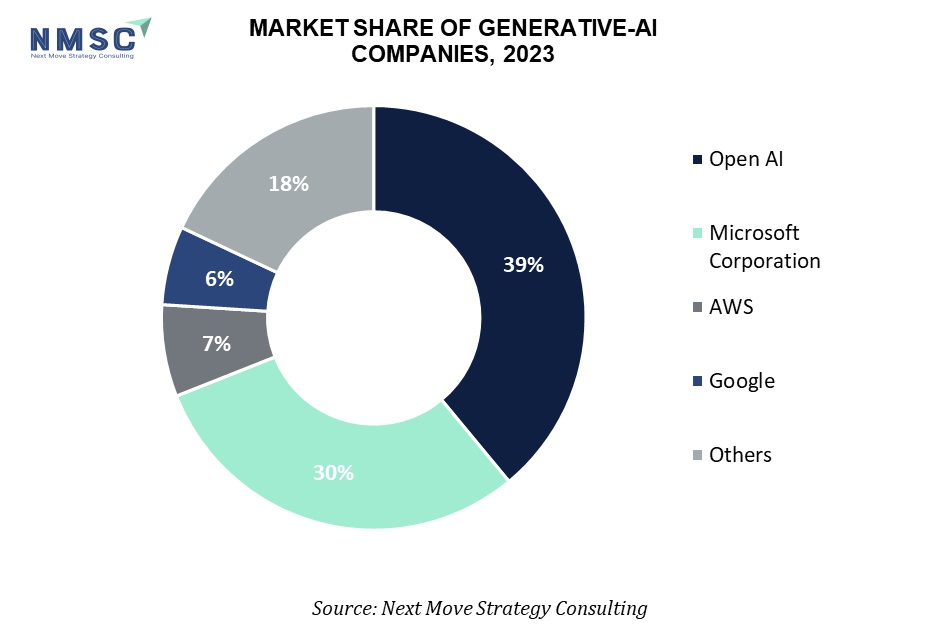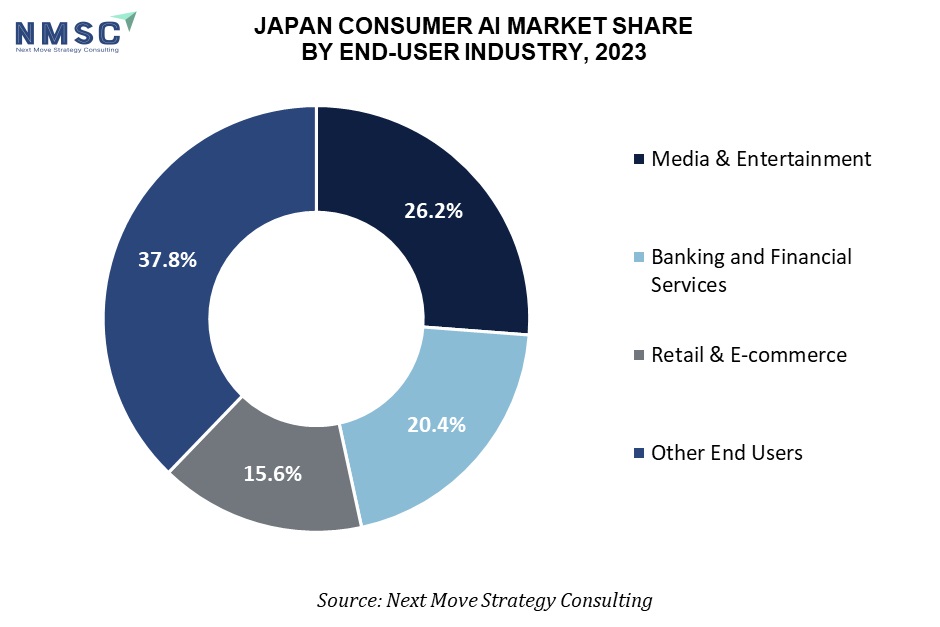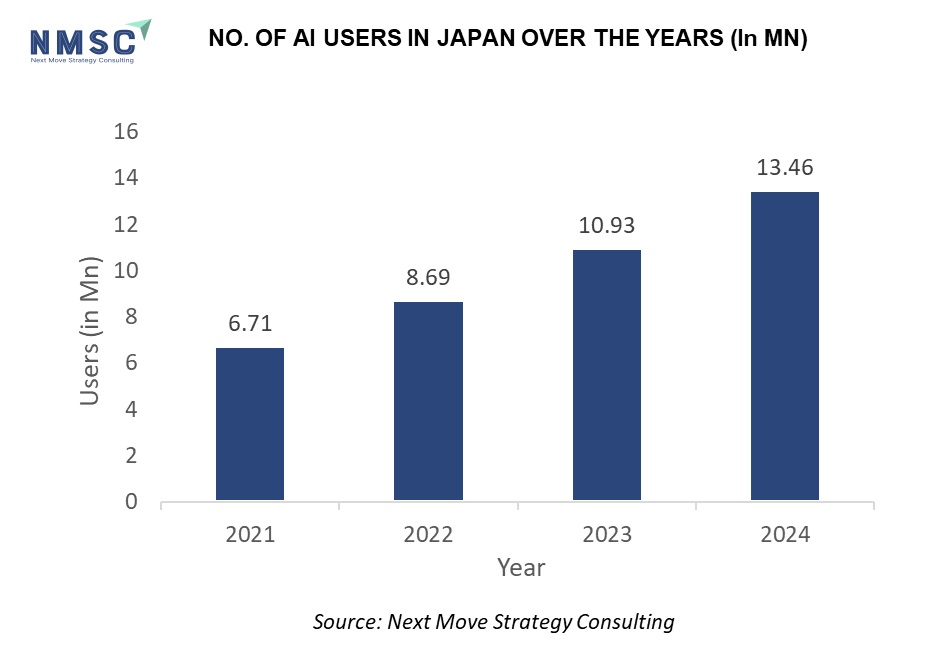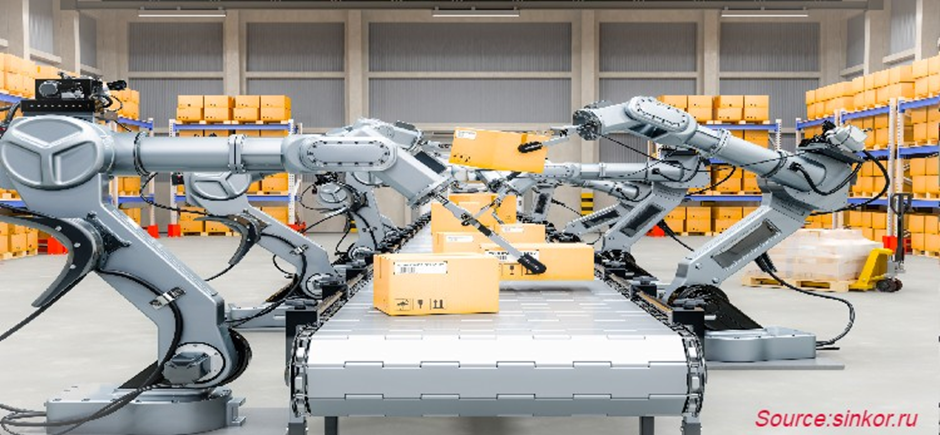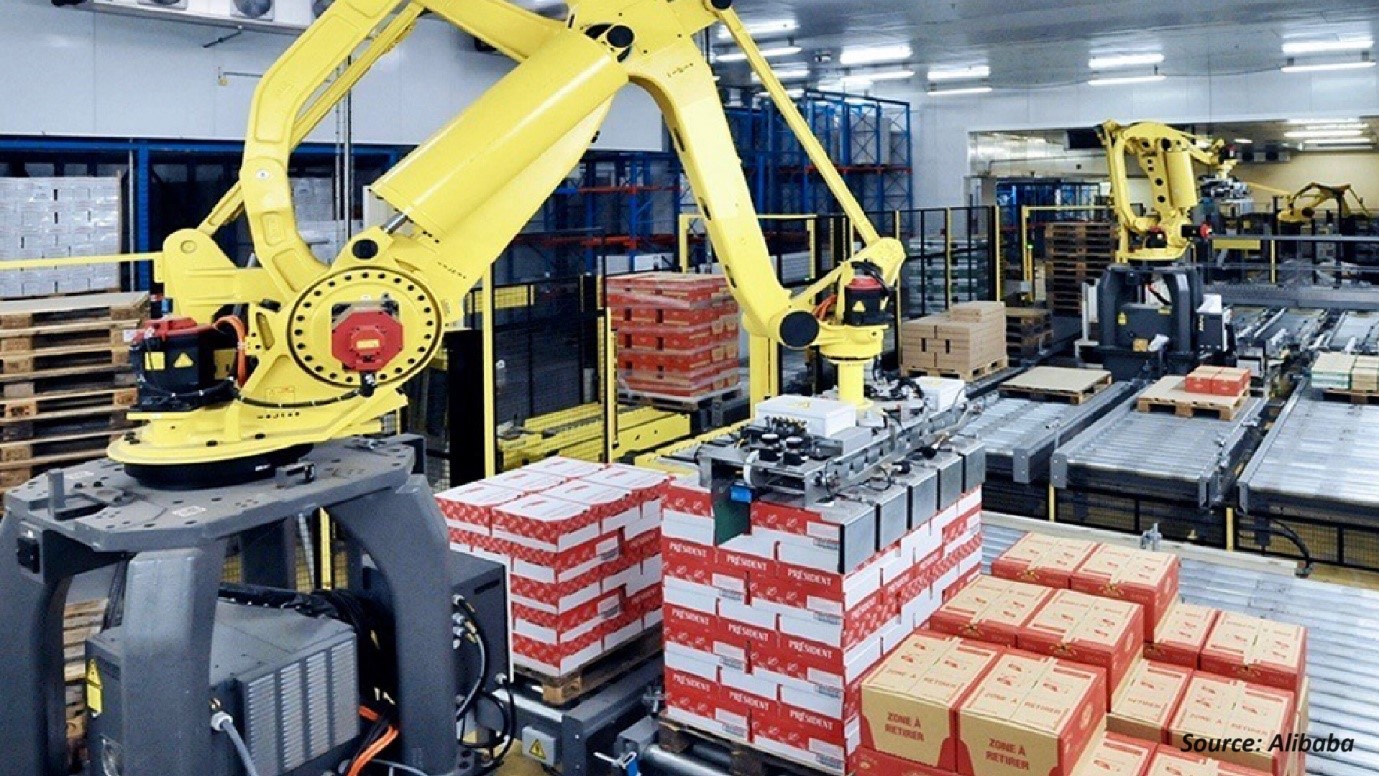Analysing Japan's $1.33 Billion Consumer AI Market: Major Players And Trends
16-Sep-2024
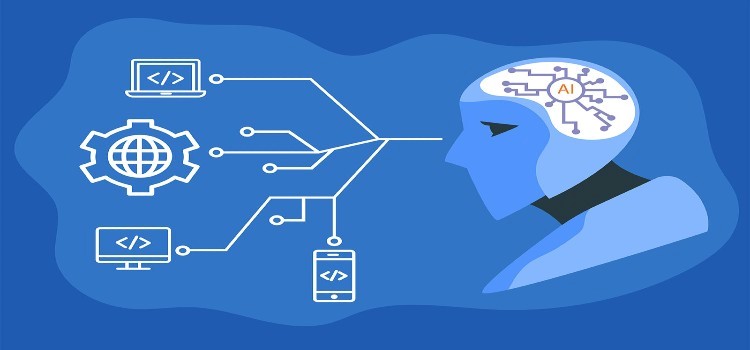
The Consumer Artificial Intelligence (AI) market is rapidly transforming industries in Japan, enhancing how individuals interact with technology in their daily lives. From AI-powered virtual assistants and personalized shopping recommendations to healthcare innovations, AI solutions are reshaping sectors such as retail, entertainment, and healthcare. In particular, Japan's tech-savvy consumers are increasingly adopting smart home devices and AI-powered platforms, contributing to the market's growth. While concerns about data privacy and ethical AI use remain, Japan is embracing consumer AI technologies, paving the way for a more connected and personalized future. In this article, we delve into the recent trends in Consumer AI market in Japan, key industry players, and the challenges and opportunities ahead.
Generative AI: Transforming Entertainment, E-Commerce, and Customer Service in Japan
Generative AI is rapidly transforming Japan’s Consumer AI market, particularly in sectors such as entertainment, e-commerce, and customer service. By creating artificial intelligence -driven tools that generate personalized content, whether it be custom advertisements, product recommendations, or even AI-generated artwork—companies are enhancing consumer experiences across various platforms. Major global players such as Midjourney, known for AI-powered artwork, and Google, with its focus on immersive generative AI technologies, are significantly impacting Japan’s creative and tech industries. One notable example in the launch of Google’s generative AI to its Search tool in August 2024, allowing users to receive text or visual results in response to prompts, including summaries. By leveraging generative AI, Google aims to enhance the search experience, providing more nuanced and contextually relevant information tailored to user queries. Also, in May 2024, Midjourney introduces AI-driven image generation version 6 that aims to deliver more precise and detailed images, enabling users to create visuals that better match their creative intentions and achieve higher levels of realism and artistic quality.
Additionally, tools such as OpenAI’s ChatGPT are being widely used in customer service, offering more natural interactions between businesses and consumers. As generative AI continues to advance, Japan’s consumer AI market is seeing more tailored, efficient, and engaging solutions, positioning the country at the forefront of AI-driven innovation.
Japan’s AI Adoption Surge: Media, Finance, and E-Commerce Lead the Way in Efficiency and Innovation:
In Japan, the rising adoption of AI models across various end-user industries reflects a broader trend toward enhancing efficiency and personalization. The Media & Entertainment sector leads this adoption, driven by the need for innovative content creation and user engagement solutions. This is followed by significant integration in Banking and Financial Services, where AI is transforming operations and customer interactions. The E-commerce sector in Japan is also experiencing rapid AI adoption, as businesses strive to offer tailored shopping experiences and improve logistics. This widespread embrace of AI is reshaping traditional processes, driving operational excellence, and fostering technological advancements across industries in Japan. The growing reliance on AI models is setting new standards for efficiency and innovation, positioning Japan as a key player in the global AI landscape.
Surge in AI Users in Japan: Transforming Business, Healthcare, and Everyday Life
The rapid growth in the number of AI users in Japan signals a transformative shift in how businesses and individuals interact with technology. This surge is fueled by increasing awareness of AI's ability to deliver personalized experiences, optimize operations, and provide data-driven insights across key sectors like retail, entertainment, healthcare, and finance. With Japan’s aging population, AI-driven solutions such as virtual assistants and healthcare applications are gaining traction to meet the demand for efficiency and convenience. Moreover, the proliferation of AI-powered tools in everyday services, from smart shopping to entertainment platforms, is not only enhancing user experiences but also driving innovation in customer engagement. As AI becomes more ingrained in daily life, Japan is witnessing an accelerated shift toward a tech-driven future, with AI adoption expected to further intensify across both consumer and industrial landscapes.
AI Model Development: Driving Innovation and Personalized Experiences in Japan’s Consumer Market
The rising focus towards the development of AI models is reshaping the technological landscape, with companies and governments recognizing their potential to drive efficiency, innovation, and consumer engagement. In Japan, this investment is particularly significant in the Consumer AI market, where businesses are leveraging advanced AI models to power virtual assistants, enhance personalized experiences, and streamline operations. These models, fueled by deep learning and natural language processing, are not only improving the accuracy and effectiveness of AI applications but also enabling seamless integration into everyday life. With Japan’s tech sector heavily focused on AI innovation, collaboration between tech giants, startups, and research institutions is accelerating the pace of AI development. Additionally, government support for AI research, along with growing awareness around ethical AI and data privacy, is creating a robust framework for continued investment. As AI models evolve, they are setting the stage for smarter, more intuitive consumer solutions. Below are a few recent developments in AI models:
|
Date |
AI Model/Type |
Creators |
News |
|
December 2023 |
Midjourney/Text-to-Image |
Midjourney |
Midjourney released Midjourney v6, an updated version of its text-to-image model with improved user experience and higher-quality image generation. |
|
December 2023 |
Gemini/Large Language Model |
|
Google announced Gemini, a formidable competitor to GPT-4, with one of its variants, Gemini Ultra, outperforming GPT-4 on several benchmarks. |
|
November 2023 |
Inflection-2/Large Language Model |
Inflection |
Inflection unveiled its second large language model, Inflection-2. |
|
November 2023 |
Claude 2.1/Large Language Model |
Anthropic |
Anthropic introduced Claude 2.1, a new version of its large language model with an industry-leading 200K context window. |
|
November 2023 |
Whisper v3/Speech-to-Text |
OpenAI |
OpenAI released Whisper v3, an open-source speech-to-text model known for its increased accuracy and extended language support. |
|
November 2023 |
GPT-4 Turbo/Large Language Model |
OpenAI |
OpenAI launched GPT-4 Turbo, an upgraded version of GPT-4 with a larger context window and reduced pricing. |
|
October 2023 |
Ernie 4.0/Large Language Model |
Baidu |
Baidu unveiled Ernie 4.0, one of the highest-performing Chinese large language models to date. |
|
September 2023 |
Mistral 78/Large Language Model |
Mistral AI |
Mistral AI introduced a compact 7 billion parameter model, Mistral 78, which outperformed Llama 2 13B in performance. |
|
August 2023 |
SynthID/Watermarking |
|
Google developed a tool to watermark AI-generated music and images, ensuring that the origin of these creations remains traceable even after modifications. |
|
August 2023 |
DALL-E 3/Image Generation |
OpenAI |
OpenAI announced the release of DALL-E 3, an improved version of its text-to-image model. |
|
July 2023 |
Llama 2/Large Language Model |
Meta |
Meta released an open-source version of its flagship large language model, Llama 2, with smaller variants that offer relatively high performance for their size. |
|
April 2023 |
Segment Anything/Image Segmentation |
Meta |
Meta introduced a new image segmentation model capable of isolating objects in images with zero-shot generalization. |
|
March 2023 |
Stable Diffusion v2/Text-to-Image Model |
Stability AI |
Stability AI launched an upgraded version of its text-to-image model, Stable Diffusion, producing higher-resolution and better-quality images. |
|
March 2023 |
GPT-4/Large Language Model |
OpenAI |
OpenAI unveiled the latest version of its generative pre-trained transformer, GPT-4. |
|
March 2023 |
Claude/Large Language Model |
Anthropic |
Anthropic released its first publicly available large language model, Claude, designed to be helpful, honest, and harmless. It outperformed humans on several benchmarks |
Source: NMSC Analysis and Publications
Summary
Japan's Consumer AI industry is poised for significant growth, driven by advancements in AI technologies and evolving consumer demands. With an aging population and a focus on enhancing convenience, AI-powered solutions are expected to play a central role in sectors including healthcare, retail, and hospitality. Personalization and seamless integration with existing digital ecosystems will fuel the demand for AI-driven products, enhancing customer experiences. Moreover, Japan's push for sustainability and data-driven decision-making will accelerate the adoption of AI, especially in edge computing and robotics. Data privacy concerns and AI's role in optimizing operations will shape the market's future trajectory, positioning Japan as a leader in innovative AI applications across industries.
AUTHOR BIO:
 Arjun Chetry is an accomplished researcher and writer with a history of more than three years of conducting thorough research. With a professional background as a research analyst, he has a keen eye for analyzing industry trends and understanding consumer behavior. His dedication to exploring diverse subjects and conducting in-depth analyses has equipped him with a deep understanding of research intricacies. He remains committed to staying up-to-date with the latest market trends and recognizing their impact on business and society. His well-rounded interests and experiences contribute to his ability to offer insights and perspectives on various topics. The author can be reached at arjun.chetry@nextmsc.com
Arjun Chetry is an accomplished researcher and writer with a history of more than three years of conducting thorough research. With a professional background as a research analyst, he has a keen eye for analyzing industry trends and understanding consumer behavior. His dedication to exploring diverse subjects and conducting in-depth analyses has equipped him with a deep understanding of research intricacies. He remains committed to staying up-to-date with the latest market trends and recognizing their impact on business and society. His well-rounded interests and experiences contribute to his ability to offer insights and perspectives on various topics. The author can be reached at arjun.chetry@nextmsc.com
Add Comment
Related Blogs
Leaders in Automation Kion, Honeywell, and ABB Influence on the Warehouse Market
Next Move Strategy Consulting forecasts that the warehouse a...
Unveiling the Top 10 Innovators in the Global Robot Vacuum Cleaner Sector
Next Move Strategy Consulting states that the global robot v...
Shaping the Future: The Transformative Impact of Packaging Robots on Manufacturing Efficiency
Packaging robots include automated machines designed to hand...



